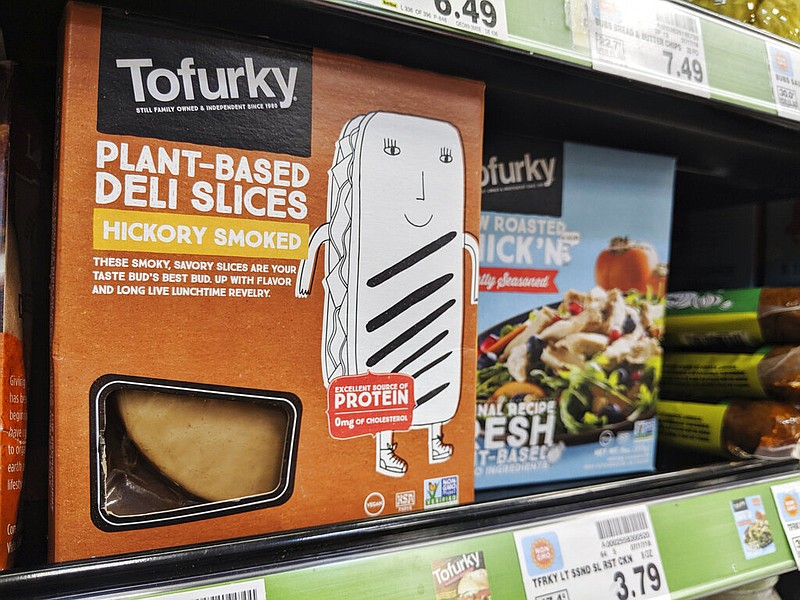A federal judge in Arkansas has struck down a 2019 state law that restricts labeling of plant-based foods, ruling in favor of Turtle Island Foods SPC -- doing business as Tofurky Co. -- which sued the state in July 2019 following implementation of Act 501 0f 2019, known as the Truth in Food Labeling Act.
The law prohibited the labeling of any food product as "meat" unless that food product was derived from livestock, and it banned such terms as "veggie sausage" and "veggie burger" from food labeling in Arkansas.
The law also provided for fines of up to $1,000 for every plant-based and cultivated meat product -- meat derived from cultivating animal cells, rather than slaughtering animals -- marketed or packaged with a "meat" label.
The labels would be subject to fines within state borders even if followed by modifiers such as "vegan," "veggie," or "plant-based."
The lawsuit, filed by Animal Legal Defense Fund, the Good Food Institute, and ACLU on behalf of Tofurky, said the law would have made it illegal for companies to use words like "burger," "roast," and "sausage" to describe products, such as veggie burgers, that are not made from animals.
U.S. District Judge Kristine G. Baker, in a 54-page order late last month, found that the challenged provisions of the law unconstitutionally limited Tofurky's commercial free speech rights. She also found a provision of the law to be unconstitutionally vague on its face and prohibited its enforcement statewide, which will prevent the state from prosecuting other plant-based food processors under the law.
Baker had temporarily blocked enforcement of the law with the issuance of a preliminary injunction in December 2019, ruling at that time that Tofurky had standing to bring the legal challenge and had met its burden to enjoin the state from enforcing the challenged provisions of the act as applied to the company.
In its complaint, first filed July 22, 2019, and in an amended complaint filed April 15, 2020, Tofurky said that by prohibiting it from marketing its products as plant-based "meats" such as "smoked ham style plant-based deli slices" or "plant-based jumbo hot dogs," the state had placed a restriction on commercial speech that prevented "companies from sharing truthful and non-misleading information about their products."
Tofurky said rather than protecting consumers from potentially misleading information, the law instead created "confusion where none existed before in order to impede competition."
As written and applied, Tofurky said, Act 501 of 2019 violated the free speech clause of the First Amendment and the due process clause of the 14th Amendment.
Tofurky maintained that plant-based meats are foods that approximate the texture, flavor and appearance of meat derived from live animals and that many varieties -- made from plant products such as soy, tempeh, wheat, jackfruit, textured vegetable protein and other vegan ingredients -- are currently available to consumers through grocery retailers and restaurants. The company said consumers rely on packaging and marketing to assist in easily identifying plant-based analogues to their favorite meat products.
The company said in its filing that all of Tofurky's packaging and marketing materials fall within existing federal labeling requirements and clearly indicate that its products are plant-based, meatless, vegetarian and vegan.
According to a press release issued Tuesday by Tofurky, the Animal Legal Defense Fund and the Good Food Institute, Arkansas's law was substantially similar to ones passed in Louisiana, Mississippi, South Dakota and other states, and that several of those laws are also facing similar legal challenges.
The release said that earlier this year, the U.S. District Court for the Middle District of Louisiana halted enforcement of that state's food labeling law, ruling it to be unconstitutional after a First Amendment challenge by Tofurky.
The release said animal agriculture industry representatives have warned meat producers that competition from plant-based and cultivated meat products represents one of the "major challenges" faced by animal meat producers.
Jaime Athos, Tofurky CEO and president, said Baker's ruling affirms what the company has been saying about its products.
"Consumers are buying plant-based products, like Tofurky, knowingly and intentionally, not because they are confused," said Athos in the release. "Consumers choose plant-based because of their values, nutritional or taste preferences and concerns about the impacts of animal agriculture on the environment. The passage of this law was never about helping consumers, it was a naked attempt by the state legislature to interfere in the marketplace and limit competition against animal agriculture interests."
Madeline Cohen, regulatory attorney for the Good Food Institute, called the order a win for consumers, saying that purchasers of plant- based products don't need "government interference from the use of well-understood terms" used to describe those products.
"U.S. food laws have long required that food producers label their products truthfully, and unnecessary and damaging laws like Arkansas' that attempt to micromanage commercial free speech are regrettable," Cohn said in the release. "The Court agrees that Arkansas consumers can clearly tell the difference between a veggie burger and a beef burger when the product label plainly indicates this. Laws like this patronize and insult the intelligence of Arkansas consumers and should be struck down given what's at stake: a more sustainable food system that works for everyone -- farmers, food companies, consumers, and entire communities."
Attorney General Leslie Rutledge, whose office defended the state in the lawsuit, said through a spokeswoman that the office has not yet determined what, if anything, it will do in response to the ruling.
"The Attorney General is reviewing the decision to determine the next step," spokeswoman Amanda Priest said in a text message Wednesday.
